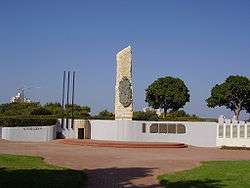Alexandroni Brigade
| Alexandroni Brigade | |
|---|---|
|
Brigade insignia | |
| Active | 1948 - present |
| Country |
|
| Allegiance | Israel Defense Forces |
| Branch | Infantry |
| Type | Reserves |
| Size | Brigade |
| Engagements |
Yom Kippur War |

The Alexandroni Brigade (3rd Brigade) is an Israel Defense Forces brigade that fought in the 1948 Arab-Israeli war. Along with the 7th Armoured Brigade both units had 139 killed during the first battle of Latrun - Operation Ben Nun Alef (an attempt to conquer the Latrun area).
The unit is currently a reserve unit.
Units
- 31st Battalion
- 32nd Battalion
- 33rd Battalion
- 34th Battalion
- 37th Battalion
Katz controversy
In 1998, Teddy Katz wrote a master's thesis at Haifa University arguing that the Alexandroni Brigade committed a massacre in the Palestinian village of Tantura during the 1948 Arab-Israeli war. The veterans of the brigade sued Katz for libel. During the court hearing Katz conceded by issuing a statement withdrawing his own work. He then tried to withdraw his statement, but the court disallowed it and ruled against him. A committee at Haifa University found problems with the thesis and ruled that it: "failed at the stage of presenting the raw material for the reader's judgment, both in terms of its organization according to strict criteria of classification and criticism, and in terms of the apparent instances of disregard for the interviewees' testimony". Some quotations in the thesis did not accord with interview recordings. The university suspended his degree and asked him to resubmit his thesis. The new thesis was rejected.[1]
In 2004, Israeli historian Benny Morris reviewed the Tantura controversy. He suggests that, while controversy remains as to whether a ‘massacre’ actually occurred, there is no doubt that war crimes were committed by the Jewish forces and that the village was forcibly cleansed of its Arab inhabitants. Morris underlines the fact that in interviews conducted by himself and by the whistle-blower Amil Gilat, all refugees confirmed that a massacre had taken place, while all IDF veterans denied it. Regarding the latter, Morris describes what he calls “troubling hints”, such as a diary by an Alexandroni soldier, Tulik Makovsky, in which he wrote
our boys know the craft of murder quite well, especially boys whose relatives the Arabs had murdered... or those harmed by Hitler. They took their private revenge, and avenged our comrades who had died at their hands, against the snipers.
Morris defended the value of oral testimony and tradition. He additionally pointed out issues with the scoring of the second version of Katz’s thesis in that the two referees who gave anomalously low scores had been co-authors of an IDF book in which it was argued that the Israeli Army had carried out only a "partial expulsion" of the populations of the Arab towns of Lydda and Ramlah, while the charge that the troops had massacred Lydda townspeople was dismissed.[2]
References
- ↑ Meron Rapoport (5 May 2005). "Alone on the barricades" (PDF). Ha'aretz.
- ↑ "The Tantura ‘Massacre’ Affair" by Benny Morris, The Jerusalem Report, 9 February 2004
External links
| Wikimedia Commons has media related to Alexandroni Brigade. |
- Official website (Hebrew)
